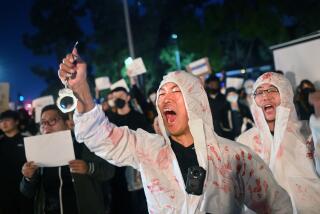ORANGE COUNTY VOICES POLITICAL REFORM : Civics Class Now in Session in E. Germany
On the first Monday in October, I crossed over the border into the German Democratic Republic. Under an international fellowship, I had come to the GDR to study the Reformation of the 16th Century. But during the two months I was there, in Leipzig and Dresden, I witnessed 20-Century history in the making, a people’s revolution that dramatically changed the shape of East German society. In short, the country I entered in October was not the same one I exited in December.
Every Monday while I was there, the politicians debated and the people of Leipzig prayed in the churches and then moved to the public square to demonstrate for social change.
In Chapman College’s Freshman Seminar Program on “War and Peace,” my colleagues and I hope to persuade our students that, as knowledgeable and involved citizens, they can make a difference, and that the freedoms we have can never be taken for granted. As I saw the students and workers of Leipzig take to the streets to achieve those rights we regard as basic--free elections, unrestricted travel, freedom of the press--I often wished our students could have been there to witness this extraordinary testimony to the power of the people.
I will never forget my own fear at crossing police lines to my apartment, overlooking the Nikolai Church, scene of the demonstrations. Nor will I forget the demonstration and police response on the 40th anniversary of the republic. The incongruity between the orchestrated parades in East Berlin and the spontaneous public demonstration against the government in Leipzig and other cities was striking.
Above all, I will never forget the courage shown by those who massed on the streets that day, weeks before the Berlin Wall was to come down, at a time when no one knew how much force the government would exert against the demonstrators. Many demonstrators feared that they would be re-enacting another, and even bloodier, Tian An Men Square.
Speculation still abounds regarding exactly what happened and who was responsible for the order not to shoot. But on that day and in the following months the resolve of the demonstrators never wavered. As many of their fellow citizens continued to pour from Hungary and Czechoslovakia into West Germany, the demonstrators, in ever growing numbers, shouted “We are staying here!” “We are the people!”
The partial changes enacted by the new post-Honecker government, even the dramatic change in travel laws and the partial dismantling of the Wall, did not satisfy the demonstrators who knew that bankrupt East German society needed a full and complete cleansing.
In large part, that cleansing has occurred. Egon Krenz and his cronies have been evicted from power, and an entire country is working to build a democratic society. In many ways, the country has experienced a massive purging. Television journalists commented that they had not served the people and asked for forgiveness and patience while they learned to be true reporters. Newspapers that had expressed only the Communist party’s positions began under new editors to record diverse opinions about what should be done next.
Perhaps even more importantly, they revealed the corruption and luxurious life styles of leaders who had constantly reminded the people of the sacrifices necessary to build a socialist state.
Suddenly a land where people had been terrified that an overheard comment could land them in prison, became a national public forum. On street corners, in trains, people talked of nothing else--sometimes with skepticism, sometimes with hope, always with passion and a sense of awe at being able to present ideas openly.
One disembodied voice I heard from loudspeakers near the old Town Hall of Leipzig urged the people not to demonstrate and pleaded that “our problems cannot be solved on the street.” But the long-term changes in the economy, education and the environment can only happen because of the courage shown during the people’s revolution that occurred in the streets of Leipzig.
When students question whether they can make a difference in society, I hope the example of the GDR will convince them of how much power they truly possess--whether they take to the streets or use their right to voice their beliefs in the voting booth. When free elections come to the GDR, I know of no East German who will need to be urged to vote. I hope the proposal voiced by several Leipzig professors comes true--that the headquarters of the hated “Stasi,” the secret police, becomes the new university library.
More to Read
Sign up for Essential California
The most important California stories and recommendations in your inbox every morning.
You may occasionally receive promotional content from the Los Angeles Times.










